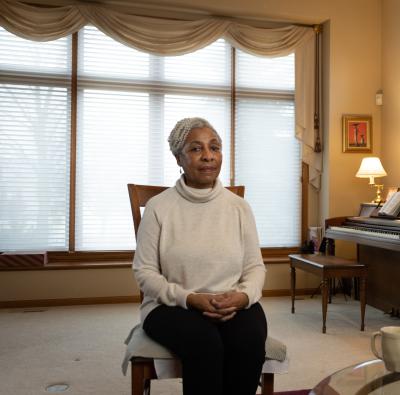Kevin Wong from Nevada thought he could not vote because of a past conviction. But he visited the website RestoreYourVote.org and learned the truth about his rights. He registered to vote that same day.
Kevin was incarcerated until 2016 and was released the day before that year's presidential elections. Highly interested in politics, Kevin was...
Frustrated by the failure of elected officials to address money in politics, ethics issues, attacks on voting rights and partisan gerrymandering – citizens across the country are taking the fight to protect democracy into their own hands through the state ballot initiative process.
During the call Citizens Take Charge: 2018 State Ballot...
Tired of waiting on Congress or the United States Supreme Court, citizens across the country are taking charge of democracy reform through state ballot initiatives.
This November voters will have the chance to vote to end extreme partisan gerrymandering, improve the way we fund elections to give every day voters a voice in the political process...
On Tuesday, November 6, citizens in North Dakota will vote on a ballot initiative that would go a long way to shedding light on financial influence over state government. Measure One would increase the transparency of spending in state elections, set limits on lobbying and misuse of campaign funds, and establish a state ethics commission.
Measure...
Tennessee Secretary of State Tre Hargett agreed to update the state’s website to correct inaccurate information about voter registration laws for citizens with past felony convictions. Tennessee’s actions come after over six months of pressure from Campaign Legal Center (CLC).
Tennessee has agreed to do three things:
- Post clear instructions abo...
The Federal Election Commission (FEC) approved a rulemaking petition, filed by Campaign Legal Center (CLC), Issue One and five former lawmakers from both parties. Published in the federal register today, The petition followed the release of our joint report, How Leadership PACs Became Politicians' Preferred Ticket to Luxury Living, highlighting the...
In our continued battle to end partisan gerrymandering, Campaign Legal Center (CLC), along with co-counsel, filed an amended complaint challenging Wisconsin’s 2011 state assembly map as a partisan gerrymander in the U.S. District Court in Wisconsin.
In June the Supreme Court declined to address the merits of the lower court’s decision. However, in...
Recently-released emails from Judge Kavanaugh’s time in the George W. Bush White House provide new insight into the nominee’s view on money in politics—and reveal that his hostility towards any reforms to limit the influence of big money on our political system may be deeper and more radical than his public judicial opinions have suggested.
Why do...
In the United States, up to 17 million Americans with prior convictions could register to vote today. Many more are eligible to restore their right to vote through an application process. However, millions are confused about whether they have the right to vote — or can have their rights restored — because of unnecessarily complicated and opaque...
Today, a North Carolina Court ruled that the state’s maps are an unconstitutional gerrymander for the second time. Plaintiffs in the case, Rucho v. League of Women Voters of North Carolina, expect the U.S. District Court for the Middle District of North Carolina’s decision to be appealed, taking the case back to the Supreme Court of the United...
Is the Federal Election Commission (FEC) so dysfunctional that super PACs think they can ignore basic reporting obligations and get away with it?
CLC filed three complaints last week asking the FEC to investigate three different super PACs, active in in Texas, Montana, and Ohio, for ignoring legal obligations that they file reports disclosing...
On Tuesday, CLC submitted comments urging the Department of Commerce not to include a proposed citizenship question on its 2020 Census because it would significantly lower and skew response rates, leading to an undercount of minority communities, which are already harder to count. An inaccurate and skewed Census count will undermine the right of...
It is illegal to make political contributions in the name of someone else. Yet, in recent months, three corporations appear to have been used to do just that.
The disclosure of who’s spending to influence elections is critical to our democracy—it’s how “citizens can see whether elected officials are ‘in the pocket’ of so-called moneyed interests,”...
In the past five years, members of Congress have spent at least $871,000 on golf club expenses, $741,000 at the St. Regis Hotels, and $469,000 at Disney World. A South Dakota Senator spent $403,000 at West Virginia’s Greenbrier Sporting Club; an Ohio Congressman spent $64,000 on Broadway tickets in New York City.
This runaway spending was brought...
On July 17, 2018, CLC hosted "After the Supreme Court: What's Next for Fair Maps," a conference call to discuss the next steps in the fight for #fairmaps.
Featuring:
Ruth Greenwood, Senior Legal Counsel, Voting Rights & Redistricting, CLC
Annabelle Harless, Legal Counsel, Voting Rights & Redistricting, CLC
Josh Penry, Principal, EIS Solutions...
Supreme Court Nominee Brett Kavanaugh’s record indicates he will expand big money in politics, weaken voter protections and put the president above the law. CLC issued a fact sheet detailing the judge's record on democracy issues.
He’s made clear that he believes money is the same as speech, and unlimited spending in elections is absolutely...
On July 20, 2018, the Republican National Committee and Donald J. Trump for President, Inc. will file disclosure reports with the Federal Election Commission. These filings will almost certainly reveal that both organizations are paying substantial sums to law firms for various kinds of legal work. Based on previous reporting and admissions of the...
Today, Campaign Legal Center (CLC) filed a complaint with the Federal Election Commission (FEC) urging it to investigate Donald Trump, his 2016 campaign committee, and the Donald J. Trump Foundation. The complaint outlines how each violated federal campaign finance law by soliciting and spending soft money in connection with Trump’s 2016 run for...
This week, a bipartisan group of Members of Congress introduced the REFUSE Act to close the loopholes that foreign actors have used to secretly influence U.S. democracy. CLC advised the House offices on the text of the bill. The bill would close the loopholes that can allow foreign-owned corporations and foreign-funded dark money groups to spend...
Last week, the Supreme Court sidestepped our challenge to the state of Wisconsin’s extreme partisan gerrymanders. Rather than ruling on the merits, the Justices sent the case, Gill v. Whitford, back to a lower court to further examine the plaintiff’s standing in the case and the serious harms that gerrymanders cause. While this means that the...
The U.S. Supreme Court sent North Carolina’s partisan gerrymandering challenge, Rucho v. League of Women Voters of North Carolina, back to a federal district court today for further analysis in light of the Whitford decision. Campaign Legal Center and the Southern Coalition for Social Justice represent the League of Women Voters of North Carolina...

